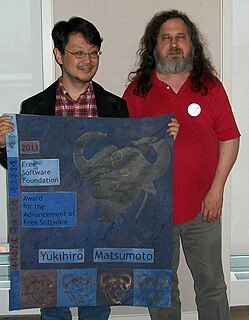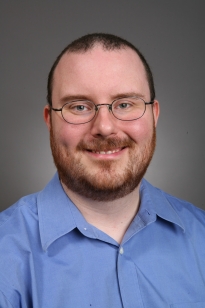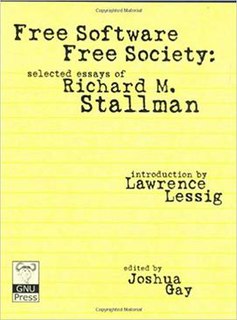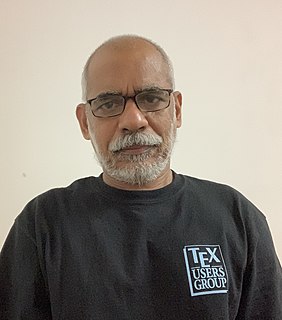
Free software or libre software, infrequently known as freedom-respecting software, is computer software distributed under terms that allow users to run the software for any purpose as well as to study, change, and distribute it and any adapted versions. Free software is a matter of liberty, not price; all users are legally free to do what they want with their copies of a free software regardless of how much is paid to obtain the program. Computer programs are deemed "free" if they give end-users ultimate control over the software and, subsequently, over their devices.
The free software movement is a social movement with the goal of obtaining and guaranteeing certain freedoms for software users, namely the freedoms to run the software, to study the software, to modify the software, and to share copies of the software. Software which meets these requirements, The Four Essential Freedoms of Free Software, is termed free software.
The Free Software Definition written by Richard Stallman and published by the Free Software Foundation (FSF), defines free software as being software that ensures that the end users have freedom in using, studying, sharing and modifying that software. The term "free" is used in the sense of "free speech," not of "free of charge." The earliest-known publication of the definition was in the February 1986 edition of the now-discontinued GNU's Bulletin publication by the FSF. The canonical source for the document is in the philosophy section of the GNU Project website. As of April 2008, it is published in 39 languages. The FSF publishes a list of licences which meet this definition.

GNU is an extensive collection of free software, which can be used as an operating system or can be used in parts with other operating systems. The use of the completed GNU tools led to the family of operating systems popularly known as Linux. Most of GNU is licensed under the GNU Project's own General Public License (GPL).

The Open Source Initiative (OSI) is the steward of the Open Source Definition, the set of rules that define open source software. It is a California public-benefit nonprofit corporation, with 501(c)(3) tax-exempt status.

Free Software Foundation (FSF) grants two annual awards. Since 1998, FSF has granted the award for Advancement of Free Software and since 2005, also the Free Software Award for Projects of Social Benefit.

Bradley M. Kuhn is a free software activist from the United States.
Alternative terms for free software, such as open source, FOSS, and FLOSS, have been a controversial issue among free and open-source software users from the late 1990s onwards. These terms share almost identical licence criteria and development practices.

Richard Matthew Stallman, also known by his initials, rms, is an American free software movement activist and programmer. He campaigns for software to be distributed in such a manner that its users have the freedom to use, study, distribute, and modify that software. Software that ensures these freedoms is termed free software. Stallman launched the GNU Project, founded the Free Software Foundation in October 1985, developed the GNU Compiler Collection and GNU Emacs, and wrote the GNU General Public License.

Copyleft is the legal technique of granting certain freedoms over copies of copyrighted works with the requirement that the same rights be preserved in derivative works. In this sense, freedoms refers to the use of the work for any purpose, and the ability to modify, copy, share, and redistribute the work, with or without a fee. Licenses which implement copyleft can be used to maintain copyright conditions for works ranging from computer software, to documents, art, scientific discoveries and even certain patents.
The Free Software Foundation (FSF) is a 501(c)(3) non-profit organization founded by Richard Stallman on October 4, 1985, to support the free software movement, with the organization's preference for software being distributed under copyleft terms, such as with its own GNU General Public License. The FSF was incorporated in Boston, Massachusetts, US, where it is also based.

Free Software, Free Society: Selected Essays of Richard M. Stallman is a collection of writings by Richard Stallman. It introduces the subject of history and development of the GNU Project and the Free Software Foundation, explains authors philosophical position on Free Software movement, deals with the topics of software ethics, copyright and patent laws, as well as business practices in application to computer software. The author proposes Free software licenses as a solution to social issues created by proprietary software and described in essays.

Free Software Movement of India (FSMI) is a national coalition of various regional and sectoral free software movements operating in different parts of India. The formation of FSMI was announced in the valedictory function of the National Free Software Conference - 2010 held in Bangalore during 20–21 March 2010. FSMI is a pan Indian level initiative to propagate the ideology of free software and to popularize the usage of the free software. One of the declared aims of the movement is to take Free Software and its ideological implications to computer users “across the digital divide”, to under-privileged sections of society.

International Centre for Free and Open Source Software (ICFOSS) is an autonomous organization set up by the Government of Kerala, India and having the combined mandate of popularizing Free and Open Source Software for universal use; consolidating the early FOSS work done in Kerala; and networking with different nations, communities and governments to collaboratively promote FOSS.

Free Software Foundation Tamil Nadu is a not-for-profit organisation formed in 2008 as a part of Free Software Movement of India (FSMI). This organisation is a social movement that works towards enlightening the masses with the essence of free software and to liberate knowledge. FSFTN organises different workshops and seminars in Tamil Nadu among the youth to spread the idea of knowledge liberation.
Swatantra 2014 was the fifth international free software conference organized by the International Centre for Free and Open Source Software (ICFOSS), an autonomous organization set up by the Government of Kerala, India for the propagation of FOSS. It was held in Thiruvananthapuram, Kerala, India during 18–20 December 2014. Among supporting organizations of the conference were the Free Software Foundation of India, Centre for Internet and Society (India), Software Freedom Law Center (India) and Swathantra Malayalam Computing.

Swecha is a non-profit organization formerly called as Free Software Foundation Andhra Pradesh (FSF-AP) later changed name to Swecha. It is a Telugu Operating System released in the year 2005, and is a part of Free Software Movement of India (FSMI). The organization is a social movement working towards educating the masses with the essence of Free Software and to provide knowledge to the commoners.
The state of Kerala, in India has had an active Free software community since early 1980s. The initial users were those who started using TeX in the city of Thiruvananthapuram. Subsequently Free software users groups were formed in some of the different cities like Thiruvananthapuram, Kochi and around engineering colleges in the state. The Free software community in Kerala was instrumental in creating a policy environment at the state government level that was biased towards Free software. The government of Kerala policy on Free software gives first preference to Free and Open Source software for its IT requirements. The state claims to be the only state in the world where IT education is imparted over a Free software operating system.
The origins of the Free software community in Thiruvananthapuram can be traced back to the group of TeX users around the University of Kerala in early 1980s. The community then later named themselves Thiruvananthapuram LUG, GNU/Linux Users Group, Thiruvananthapuram and then ultimately Free Software Users Group, Thiruvananthapuram. The community has worked with the government in helping with key Free software initiatives in the government and also in promoting and supporting Free software among the general public. The community has also been instrumental in creating an IT policy favorable to Free software in the state of Kerala.

Chandroth Vasudevan Radhakrishnan aka CV Radhakrishnan aka CVR, is an Indian free software developer, entrepreneur and the Founder of River Valley Technologies. He is also one of the founding members of TeX Users Group in India.













